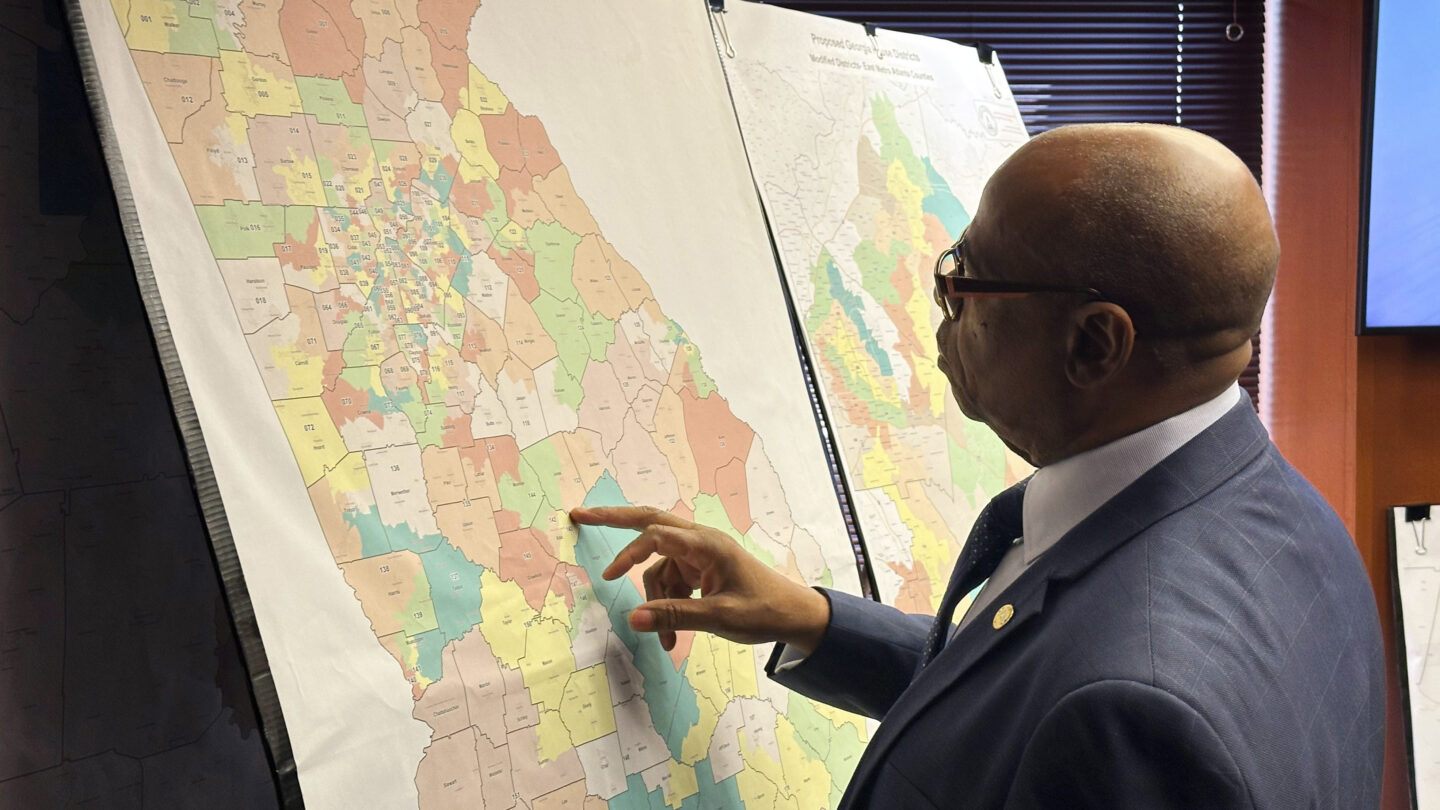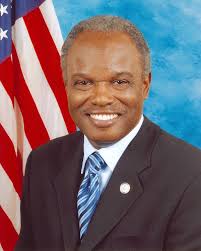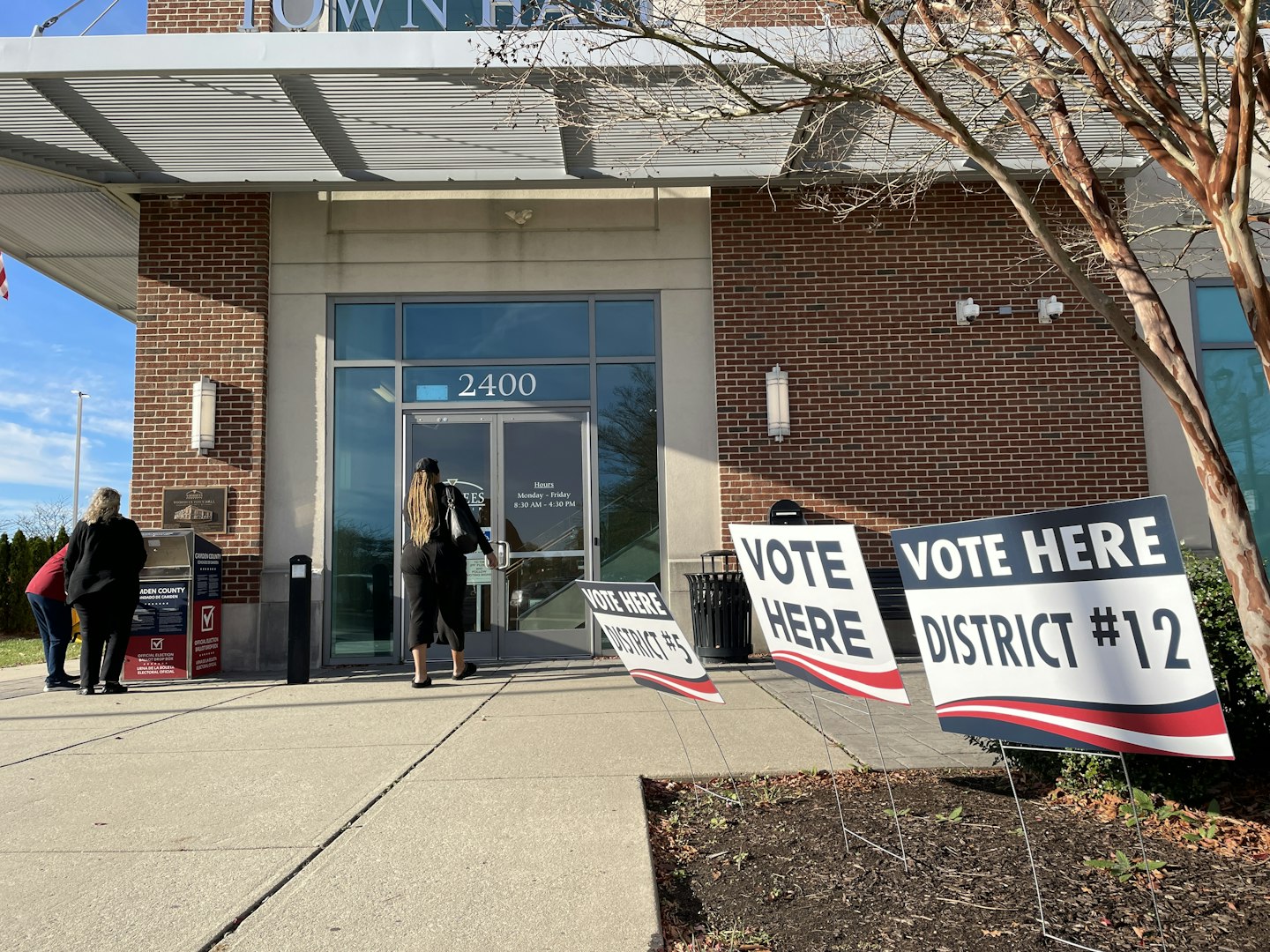IRS Announces Churches Can Now Endorse Political Candidates Without Losing Tax Exemption
Georgia Public Service Commission Heads Into Runoff
Senator John Ossoff Takes On Corporate Landlords That Are Affecting The Availability Of Homes In Georgia
Gauge their presence and influence in Georgia's housing market Assess how their acquisitions are affecting affordability and availability of homes for residents Examine ownership structures , which often involve layers of LLCs that obscure who actually owns the properties Evaluate whether tenants and communities face difficulties due to absentee or corporate ownership, such as poor maintenance or lack of accountability
Excessive and inappropriate fees : Tenants report being charged for minor or questionable infractions, such as automatic late fees, maintenance charges for unresolved issues, or administrative fees not clearly disclosed in leases. Neglect of maintenance and repairs : Corporate landlords are frequently criticized for delayed or inadequate responses to maintenance requests, leaving tenants with unsafe or unhealthy living conditions. Poor communication and responsiveness : With many landlords operating out-of-state or via third-party management companies, tenants often face frustrating bureaucratic obstacles when trying to get help or resolve disputes. Higher eviction rates : Studies have shown that institutional investors evict tenants at significantly higher rates than traditional landlords, even during times of economic hardship or when eviction moratoriums were in place.
The Democratic Party of Georgia Sets The Stage For New Leadership
The Democratic National Committee Steps Into The Legal Fight Against Georgia Voting Rules Changes
Atlanta School System Opting Out Of Tax Breaks & What It Could Mean For Homeowners
Federal Funding Freeze Paused.... For Now!
Georgia Legislators Introduce Bill Calling For Accountability From Homeowners Associations
Voting Guidelines for HOA Meetings : Defines who is eligible to vote in HOA meetings. Limits voting to one vote per household, regardless of the number of residents in the home. Requires HOA elections to be conducted following specific procedures to ensure fairness. Election Oversight and Transparency : Mandates that election votes be scanned and preserved for at least one year after the election. Provides guidelines for homeowners to dispute election results. Board Member Requirements : Requires all HOA board members to live within the HOA community, ensuring decisions are made by individuals directly impacted by the community's policies. Secretary of State’s Oversight : Assigns the Secretary of State the responsibility to: Oversee HOAs. Certify HOA elections. Investigate complaints. Impose penalties for violations.
White House Pauses Federal Grants, Loans And Financial Assistance Programs Many Americans Depend On

Federal Appeals Court Weighs the Future of Georgia’s New District Lines for Congress and the State Legislature
Stacey Abrams Led Organization To Pay The Largest Fine In Campaign Finance History In Georgia

Georgia's Legislative Session First Day Recap
Judge Rules Fulton County Commissioner Khadijah Abdur-Rahman Violated Georgia Campaign Finance Law
Senator Ossoff Launches Inquiry into ‘Unprompted Searches" of Black Travelers at Hartsfield Jackson Airport
Georgia Congressman David Scott AGAIN Misses Votes In DC Due To Illness

Georgia's 2024 Early Voting Surpasses 56% of the 2020 Voter Turnout

Judge Blocks Virginia From Removing Alleged Noncitizens From Voter Rolls

Key Takeaways From VP Kamala Harris' CNN Townhall
By Kishana L. Holland, Communications Director
The Flip Flopping Continues
Refusal To Answer Questions

Georgia Supreme Court Blocks New Election Rule

Georgia Surpasses One Million Votes For The First Week Of Early Voting

Republican House Candidate Runs Ad with Wrong Election Date In Black Newspaper In Attempt to ‘Deceive’ Voters

A Shortlist of Who Could Be The Democratic VP Pick

Lucy McBath is Interested in Running for Governor.... NOT Being Your Congresswoman in District 6
May 31, 2024
In a scathing thank you to voters, newly elected 6th Congressional District Congresswoman Lucy McBath let voters know she is seriously considering a 2024 gubernatorial run during the "Politically Georgia" podcast this week.
Unbeknownst to the people of the newly formed district who voted her in for a two year term, Lucy thanked them by saying thanks but no thanks. The news, while unsettling, not very surprising to many. McBath amassed over one million dollars in fundraising that not only gave her an advantage over her two opponents, but seamlessly ushered her to victory.
The bigger question is "Where is Lucy"? Seldom seen on the campaign trail and never present in the district (Primarily The South Side of Atlanta) which her money fought so hard to win.
This latest news and "election betrayal" certainly delivers a glimpse into Congresswoman McBath 's concentration for the next two years. A year of photo-op's, exploratory campaigns, fundraising and a reminder to the people of the 6th District their vote was essential for her ultimate goal... Governor!
Listen To The Politically Georgia Podcast HERE.
Georgia Prepares For Potential Mass Voter Challenges In The November Election
May 31, 2024
Georgia Democrats are sounding the alarm over potential mass voter challenges ahead of the November election.
Georgia law allows local voters to challenge the eligibility of as many people as they want if they suspect the person is ineligible to cast a ballot. Ahead of the Jan. 2021 runoffs for the U.S. Senate, a conservative vote monitoring group called True the Vote challenged hundreds of thousands of voters’ eligibility.
In a ruling this January, a federal judge said he could not condone “TTV’s actions in facilitating a mass number of seemingly frivolous challenges” but could not “under the operative legal framework say that these actions were contrary to Georgia law.”
Atlanta Democratic Rep. Saira Draper, who is also an attorney and voting rights advocate, said Democrats expect even more challenges this year because of two controversial voting laws passed since the last presidential election.
Senate Bill 202, passed in 2021, clarified that there is no legal limit on the number of voter challenges one can make, and Senate Bill 189, signed by Gov. Brian Kemp earlier this month, outlines possible reasons to challenge eligibility.
“We know that right wing activists are planning to make voter challenges a big part of their electoral strategy for this presidential election,” she said at a Thursday press conference outside the state Capitol. “In fact, they are using a software that they developed called Eagle AI that allows a challenger to file thousands of meritless voter challenges at a time with just a few clicks of a mouse. And they are actively recruiting people to use this tool across our state.”
Candace Smith, an Atlanta attorney, said her eligibility was improperly challenged ahead of last week’s primary election.
Smith said she has lived at the same address for more than 20 years and voted in nearly every election since 1993, but when she logged onto her voter page on the secretary of state’s website last Tuesday, she saw her voter registration had been challenged.
“No reason was given for the challenge at all,” she said. “It said the reason for the challenge is blank, and I was directed to contact my county elections office for more information. I have been a Georgia voter for decades and as a result this was pretty shocking.”
Smith said she was able to get the problem resolved and ensure her vote was counted, but she worries that others who don’t have the same time or tenacity might not be able to.
“A voter who doesn’t have the time or the resources to resolve a challenge to the registration might simply give up and go home or not leave the house at all,” she said. “For many, just receiving this intimidating message, whether in error or otherwise, may keep them from voting again.”
Speaking to the Recorder after the press conference, Draper expressed confidence that the results of this year’s elections will be fair, even if that involves going to court.
“In the outcome of the 2020 election, there were dozens of lawsuits that were filed over ballots that had been cast, and those lawsuits were speedily resolved to show that the elections in Georgia were valid,” she said. “So we certainly have the traditional process at our disposal that we can use if we deem that we need to. But part of what we are talking about now is preventative action that we can take with organizing and education with voters so that we can hopefully prevent any of that from happening before it starts. And I think having that two-tier approach is very important.”
“Of course, we’re going to use all the options that are available to us,” she added. “But balancing the messaging and this narrative about the importance of the integrity of elections, we have to consider that in any kind of action that we’ll take because accepting the outcome of legitimate elections is absolutely critical for democracy.”
In an email, Mike Hassinger, spokesman for the Georgia Secretary of State’s office, challenged Draper’s characterization of state law and said remarks like Draper’s are often used to fire up voters and raise money.
“Georgia’s ‘voter challenge’ law has been on the books since the early 1980s,” he said. “Prior to this year’s session of the General Assembly, it had virtually no guidance about the process by which anyone can challenge the right of an elector to be listed on a voter registration list. Anyone could challenge the eligibility of any voter, for any reason, at any time. Section 5 of SB 189 defines what can be considered probable cause for bringing a voter challenge (such as a registered voter being deceased, being registered in another jurisdiction, claiming a homestead exemption in another jurisdiction, being registered at a non-residential address as confirmed by a government office or database or publicly available source derived solely from such governmental sources). It also specifies that any voter challenges brought within 45 days of an election will not be considered until after the election.”
The Racist History Of The Georgia Runoff
May 10, 2024
The Georgia voting law that mandates a runoff when a candidate does not obtain more than 50% of the vote is the result of racist legislation. This law was introduced by staunch segregationist legislator, Denmark Groover. When Groover lost reelection to the Georgia House of Representatives in 1958 despite winning the majority of the white vote, data from segregated polling places in Macon revealed that Black voters contributed to the upset victory by his opponent. When Groover won his seat back in 1963, he led the charge to break up what he described as the “Negro Voting Block, ” by transitioning Georgia from plurality voting, which allows the candidate with the most votes to be declared the winner, to majority voting – forcing voters to choose between the two candidates with the most votes in a separate runoff election. Groover was determined to stop Black Georgians from having any voting power. Thus, the runoff was created
What SB63 Means For Georgians Who Are Incarcerated Solely Because They Can’t Pay Bail.
May 24, 2024
Governor Brian P. Kemp signed SB63 into law. This law will result in more overcrowding in jails for people unable to afford bail and force many others to spend more time locked up before they can appear before a judge.
The bill also BANS charities, corporations, and individuals from donating to cash bail funds more than three times a year unless they register as a bail bond company. Under the law, a suspect is required to put up a specified amount of money or property as collateral if they are charged with a state crime punishable by jail or prison time. Supporters say the bill intends to curb the number of people who don’t show up to court and are more likely to re-offend after being released from jail on a signature bond.
SB 63 would harm low-income Georgians in need by severely restricting charitable bail organizations. By limiting judicial discretion through requirements that cash bail be set for a variety of misdemeanors, and by restricting charitable bail organizations, churches, and individuals from supporting members of their community with bail assistance, SB 63 will fuel mass incarceration while removing a lifeline to impoverished Georgians who are incarcerated solely because they can’t pay bail.
Full List Of Vetoed Bills, HERE.
Gov. Kemp Signs Fiscal Year 2025 Budget to Invest in Education, Public Safety And Healthcare
May 8, 2024
Governor Brian P. Kemp, joined by First Lady Marty Kemp, Lieutenant Governor Burt Jones, Speaker Jon Burns, constitutional officers, members of the General Assembly, and state and local elected officials, signed the $36 Billion Fiscal Year 2025 Budget (HB 916) on May 7, 2024 at a signing ceremony in the North Wing of the Georgia State Capitol. This budget was carefully worked on by Senate and House Appropriations Chairmen Blake Tillery and Matt Hatchett, along with members of both legislative chambers and invests in public safety, education, healthcare, workforce development, and much more.
The budget, totaling $36.1 billion in state money and $66.8 billion overall, includes pay raises for public school teachers, state employees, state law enforcement officers, and child welfare workers.
K-12 certified teachers will reportedly receive a $2,500 pay increase, with $382.1 million allocated in the budget. Law enforcement and child welfare workers will receive a $3,000 raise, while state employees, including public university employees making less than $70,000, will receive a 4% pay increase.
Additionally, the state's pre-K system will receive $48 million in state lottery funds, and $19 million is being directed toward domestic violence shelters and sexual assault survivors. Millions of dollars will also be spent on nursing homes, health care providers, physical and occupational therapists, and doctors.
The budget allocates $1.5 billion for state transportation projects, $250 million for local water and sewer projects, nearly $600 million for the Department of Corrections, and $100 million for rural economic development projects.
Tuesday also marked the last day for Gov. Kemp to sign or veto legislation. Kemp has already enacted dozens of bills into law, including legislation addressing antisemitism, a school voucher bill, and measures reducing tax rates for Georgia residents and businesses.
With the 2024 presidential contest looming, Governor Kemp signed new election changes into law.
SB 189 lists death, evidence of voting or registering in another jurisdiction, a tax exemption indicating a primary residence elsewhere, or a nonresidential address as probable causes for removing voters from the rolls. The measure also requires homeless people to use the county voter registration office as their address instead of where they live. Kemp also vetoed twelve other bills, including several other election bills.
Full List Of Vetoed Bills, HERE.
USPS Could Affect Absentee Ballots in Georgia This Election Cycle
April 23, 2024
Georgia continues to take center stage in terms of elections. The peach state is currently experiencing mail delays of up to one month. The USPS has found itself in the national spotlight following a U.S. Senate Hearing on April 16, 2024 that centered on the Postal Service’s implementation of the “Delivering for America” plan and subsequent disruptions in the Georgia area.
During that hearing, Postmaster General Louis DeJoy said delivery times should significantly improve in Georgia within 60 days, but senators on both sides of the aisle were concerned about the coming elections and potential impacts. And while DeJoy reminds us all that "Ballots will be fine", Georgia counties are not taking any chances. Voters are being urged to place completed ballots in an official drop box during advance voting instead of using USPS. The secure drop boxes are under the visual surveillance of an election official.
To learn how to track your Georgia absentee ballot, visit here.
Three Georgia Bills That Could Impact The 2024 Elections
April 16, 2024
Georgia has once again taken center stage in terms of elections. The peach state will be home pivotal races for local, statewide and national offices this 2024 election cycle. Bills have already been sent to Gov. Brian Kemp to be signed into law and THREE bills could change the way elections across the state are conducted, tallied and audited.
House Bill 974: A bill that would allow ballots cast in an election to be uploaded to the Georgia Secretary of State’s website for the public to access successfully passed through the Georgia legislature on the final day of the 2024 session.
The measure, authored by state Rep. John LaHood (R-Valdosta), was designed to increase transparency and public confidence in election results throughout the state in response to a deluge of election deniers who have repeatedly claimed the 2020 presidential election was stolen.
The digital scans will not contain identifying information of any voters and must be posted by 5 p.m. on the second Friday after the election. The bill also includes new guidelines on election audits, requiring that the risk of an incorrect outcome does not exceed 8% during the 2024 election season, and dropping to 5% by 2028.
House Bill 1207: Initially a bill that governed ballot proofing procedures for local superintendents, House Bill 1207 was amended in the Senate Ethics Committee to include language from SB 221, a controversial elections bill that failed to pass during the 2023 legislative session.
The new section requires all election workers to be U.S. citizens, in addition to outlining protections for poll watchers and eliminating the requirement for polling places to maintain a ratio of one voting machine for every 250 voters. It also limits a candidate’s timeframe for reviewing their information before it officially appears on a ballot, giving them a maximum of 24 hours to request any changes.
Senate Bill 189: This bill would implement sweeping changes to current voting laws aimed at improving election security and voter confidence.
Among other things, it would allow mass voter challenges, change the rules governing where homeless voters can register, and eliminate the use of QR codes on ballots. It would also shorten the timeframe for early and absentee ballots to be counted, requiring the tabulation to be completed within an hour of the polls closing on election day.
Mass voter challenges have been on the rise in Georgia over the past several years, often coinciding with pivotal elections throughout the state. Over 360,000 Georgia voters had their eligibility challenged by the Texas-based organization True the Vote leading up to the 2021 U.S. Senate runoff.
SB 189 outlines several factors that can be used to determine the validity of a voter challenge, but does not limit which factors can be used to place a claim, or how many challenges an individual or organization can file. It would also allow voters to be removed from the rolls until 45 days before an election, violating the National Voter Registration Act, which bans challenges within 90 days of an election.
Three Georgia Bills That Could Impact The 2024 Elections
April 16, 2024
Georgia has once again taken center stage in terms of elections. The peach state will be home pivotal races for local, statewide and national offices this 2024 election cycle. Bills have already been sent to Gov. Brian Kemp to be signed into law and THREE bills could change the way elections across the state are conducted, tallied and audited.
House Bill 974: A bill that would allow ballots cast in an election to be uploaded to the Georgia Secretary of State’s website for the public to access successfully passed through the Georgia legislature on the final day of the 2024 session.
The measure, authored by state Rep. John LaHood (R-Valdosta), was designed to increase transparency and public confidence in election results throughout the state in response to a deluge of election deniers who have repeatedly claimed the 2020 presidential election was stolen.
The digital scans will not contain identifying information of any voters and must be posted by 5 p.m. on the second Friday after the election. The bill also includes new guidelines on election audits, requiring that the risk of an incorrect outcome does not exceed 8% during the 2024 election season, and dropping to 5% by 2028.
House Bill 1207: Initially a bill that governed ballot proofing procedures for local superintendents, House Bill 1207 was amended in the Senate Ethics Committee to include language from SB 221, a controversial elections bill that failed to pass during the 2023 legislative session.
The new section requires all election workers to be U.S. citizens, in addition to outlining protections for poll watchers and eliminating the requirement for polling places to maintain a ratio of one voting machine for every 250 voters. It also limits a candidate’s timeframe for reviewing their information before it officially appears on a ballot, giving them a maximum of 24 hours to request any changes.
Senate Bill 189: This bill would implement sweeping changes to current voting laws aimed at improving election security and voter confidence.
Among other things, it would allow mass voter challenges, change the rules governing where homeless voters can register, and eliminate the use of QR codes on ballots. It would also shorten the timeframe for early and absentee ballots to be counted, requiring the tabulation to be completed within an hour of the polls closing on election day.
Mass voter challenges have been on the rise in Georgia over the past several years, often coinciding with pivotal elections throughout the state. Over 360,000 Georgia voters had their eligibility challenged by the Texas-based organization True the Vote leading up to the 2021 U.S. Senate runoff.
SB 189 outlines several factors that can be used to determine the validity of a voter challenge, but does not limit which factors can be used to place a claim, or how many challenges an individual or organization can file. It would also allow voters to be removed from the rolls until 45 days before an election, violating the National Voter Registration Act, which bans challenges within 90 days of an election.
Georgia Legislative Session Wrap-Up
March 29, 2024
It is finally OVER.. After a marathon of late-night legislating, Georgia state lawmakers hit the snooze button. The 157th General Assembly worked until the wee hours of the morning passing bills for Governor Kemp's consideration.
The legislators finalized a budget in the final hours of session and passed a controversial omnibus election bill that critics say will burden election workers and impact the November presidential election in this key battleground state. A significant change in the final budget is an infusion of new funds into pre-K education. Gov. Kemp sent a letter to revise his revenue estimate to increase Georgia Lottery funds by $48.2 million to request more funds for pre-K, in line with recommendations from the House Working Group on Early Education, led by Speaker Pro- Tem Jan Jones. This could mean salary increases for lead and pre-K teachers on par with K-12 schools, increases in start-up grants for new pre-K classrooms, new funding for student transportation and an operating increase for private pre-K providers.
And for the Wins...
State employees will get additional $3,000 raises, including law enforcement officers, corrections officers and child welfare workers.
The two chambers agreed to provide hundreds of millions of dollars more for Medicaid programs, including $18.6 million to increase payments to some medical providers, such as obstetricians, optometrists, audiologists and physical therapists.
Adult dental care was also fully funded with an additional $10.5 million, and independent pharmacists will see higher reimbursement rates through a new $6.2 million appropriation.
Behavioral health got a boost, with $2.5 million to expand jail-based competency programs, $26 million for housing voucher slots and $1 million to expand mental health services in schools.
A backlog of cases at the Sexual Offender Risk Review Board will be addressed through a $2.5 million increase
$19 million will go to domestic violence shelters and sexual assault centers.
$866 million in capital projects for schools systems, colleges, universities and state-funded agencies will be funded with cash rather than bonds, reducing future debt obligations.
And The Losses....
Senate Bill 189 sets new rules for challenging voters and who can qualify to be placed on Georgia’s presidential ballots.
This continuation of voter suppression rules that state lawmakers have instituted over the past few years to dissuade voters and make the election process tougher will take effect in July 2024. Election workers will be further overwhelmed with additional voter eligibility challenges as a result of this bill.
The legislation, which now goes to Gov. Kemp for consideration, includes provisions to remove the secretary of state from the state election board, let any political party that qualifies for the presidential election in at least 20 states or territories be placed on Georgia’s presidential ballot, and make it easier for counties to fill vacancies when an elected official prematurely leaves office. The bill also calls for all advance and absentee ballots to be counted within an hour of the polls closing, changes ballot design and creates voting changes for the homeless.
What Didn't Make The Cut....
SB386 Measures to legalize sports betting
The review and possible roll back the state’s film tax credit, which offers over $1 billion in tax rebates to production companies each year. The Senate settled on a bill that would require movie producers to film in more Georgia locations, use more local crew and invest more in local studios to earn the credit. But on the last day of session, the film bill was rolled into SB349 which also contains tax credit measures for interactive gaming and affordable housing.
Statement on Cobb County Commission's Reckless Candidate Qualifying Process
March 6, 2024
March 4, 2024 Atlanta – Secretary Raffensperger issued the following statement on Cobb County’s decision to disregard state law and qualify candidates using district maps drawn by the Cobb County Commission rather than maps enacted by the General Assembly:
Georgia is recognized as a national leader in elections. It was the first state in the country to implement the trifecta of automatic voter registration, at least 17 days of early voting (which has been called the “gold standard”), and no-excuse absentee voting. Georgia continues to set records for voter turnout and election participation, seeing the largest increase in average turnout of any other state in the 2018 midterm election and record turnout in 2020, and 2022. 2022 achieved the largest single day of in-person early voting turnout in Georgia midterm history utilizing Georgia’s secure, paper ballot voting system. Most recently, Georgia ranked #1 for Election Integrity by the Heritage Foundation, a top ranking for Voter Accessibility by the Center for Election Innovation & Research and tied for number one in Election Administration by the Bipartisan Policy Center.
2024 is a pivotal year as with not only the presidential election, but also the majority of the country’s House seats will be up for re-election. A ll 14 of the state's congressional seats, plus its 56 state Senate seats and 180 state House seats are also up for grabs. In Georgia, district lines have changed, meaning some people will need to run in another district.
Parties will decide their nominees in primaries on May 21, the same day Georgia will elect judges and other nonpartisan offices. Runoffs will be held on June 18 for any offices in which a candidate doesn’t win a majority on May 21.
Of the 13 congressional incumbents seeking reelection, 12 quickly qualified on Monday. They included all five Democratic U.S. representatives — the 2nd Congressional District’s Sanford Bishop, the 4th District’s Hank Johnson, the 5th District’s Nikema Williams, the 6th District’s Lucy McBath, and the 13th District’s David Scott. Also qualifying were seven of the eight Republican incumbents seeking election: the 1st District’s Buddy Carter, the 5th District’s Andrew Clyde, the 7th District’s Rich McCormick, the 8th District’s Austin Scott, the 11th District’s Barry Loudermilk, the 12th District’s Rick Allen and the 14th District’s Marjorie Taylor Greene.
As a result of court ordered redistricting, all the members of Congress whose districts touch metro Atlanta have at least some new territory, as do many state Senate districts in metro Atlanta and state House districts in metro Atlanta and middle Georgia. A judge ruled those lines discriminated against Black voters, prompting another round of redistricting that is likely to preserve Republican majorities.
Qualifying Week For Georgia
March 6, 2024
The 2024 election season is officially underway as qualifying for Georgia’s state and federal offices began Monday March 4th and concludes Friday March 8th at noon.
2024 is a pivotal year as with not only the presidential election, but also the majority of the country’s House seats will be up for re-election. A ll 14 of the state's congressional seats, plus its 56 state Senate seats and 180 state House seats are also up for grabs. In Georgia, district lines have changed, meaning some people will need to run in another district.
Parties will decide their nominees in primaries on May 21, the same day Georgia will elect judges and other nonpartisan offices. Runoffs will be held on June 18 for any offices in which a candidate doesn’t win a majority on May 21.
Of the 13 congressional incumbents seeking reelection, 12 quickly qualified on Monday. They included all five Democratic U.S. representatives — the 2nd Congressional District’s Sanford Bishop, the 4th District’s Hank Johnson, the 5th District’s Nikema Williams, the 6th District’s Lucy McBath, and the 13th District’s David Scott. Also qualifying were seven of the eight Republican incumbents seeking election: the 1st District’s Buddy Carter, the 5th District’s Andrew Clyde, the 7th District’s Rich McCormick, the 8th District’s Austin Scott, the 11th District’s Barry Loudermilk, the 12th District’s Rick Allen and the 14th District’s Marjorie Taylor Greene.
As a result of court ordered redistricting, all the members of Congress whose districts touch metro Atlanta have at least some new territory, as do many state Senate districts in metro Atlanta and state House districts in metro Atlanta and middle Georgia. A judge ruled those lines discriminated against Black voters, prompting another round of redistricting that is likely to preserve Republican majorities.
Why Nevada is Having GOP Caucuses And A Primary This Year
February 6, 2024
Nevada is typically a major, hard-fought stop on the path to the Republican presidential nomination — except this year, the fight is off.
Key Facts About Black Eligible Voters In 2024
January 24, 2024
The number of Black eligible voters in the United States is projected to reach 34.4 million in November 2024 after several years of modest growth. And Black eligible voters stand out for turnout rates that are higher than among Latino and Asian eligible voters.
Black voters could play an important role in determining the outcome of key 2024 elections, including for U.S. president. In Georgia, a closely watched swing state, Black Americans account for a third of eligible voters.
In 2020, 92% of single-race Black, non-Hispanic voters cast a vote for Democrat Joe Biden, while only 8% backed Republican Donald Trump, according to a Pew Research Center analysis of validated voters.
Fulton County District Attorney Fani Willis Alleged Romantic Involvement With Trump Prosecutor May Result In Dropped Charges, Disbarment and Jail Time
January 9, 2024
Former President Donald Trump is insisting any and all charges against him and several others in Georgia over efforts to overturn the state’s 2020 election results should be dropped after another defendant filed a motion accusing Fulton County District Attorney Fani Willis of improper behavior.
Fulton County District Attorney Fani Willis hired an alleged romantic partner to lead the Atlanta prosecution of former President Donald Trump and 18 others on election conspiracy charges and improperly financially benefited from that relationship, tainting the entire case, according to a new court filing by one of Trump’s co-defendants.
The 127-page motion was filed Monday by a lawyer for longtime Trump associate Michael Roman, who was indicted for his alleged role as a campaign official in trying to help Trump overturn the Georgia election in 2020 after President Joe Biden’s victory in the state.
The motion seeks to dismiss the charges against Roman on the grounds that they are “fatally defective," the filing by Roman's attorney, Ashleigh Merchant, argues. It also seeks to disqualify Willis, the entire Fulton County District Attorney’s Office and the special prosecutor, Nathan Wade, because the two “have been engaged in an improper, clandestine personal relationship during the pendency of this case.”
According to county records cited by the Journal-Constitution, Wade has been paid nearly $654,000 in legal fees since January 2022. It said that as DA, Willis “authorizes his compensation.”
The filing alleges that Wade, a prominent Georgia private attorney and former municipal court judge, paid for vacations with Willis to the Napa Valley in California, to Florida, and on a Caribbean cruise using funds his law firm received from Willis' office.
The filing alleges that it is basing its claims on "sources close to both the special prosecutor and the district attorney," and that the personal relationship between the district attorney and the special prosecutor "began before this prosecution was initiated and before the district attorney appointed the special prosecutor."
Based on the timing of the payments, and the alleged trips together, "the district attorney and the special prosecutor have violated laws regulating the use of public monies, suffer from irreparable conflicts of interest, and have violated their oaths of office under the Georgia Rules of Professional Conduct and should be disqualified from prosecuting this matter," the motion states.
For instance, Wade purchased hotel rooms for personal trips with funds from the same account his firm used to receive payments under his contract with Willis, the motion alleged.
It also alleged that Willis and Wade "have been seen in private together in and about the Atlanta area and believed to have co-habited in some form or fashion at a location owned by neither of them."
And the motion claimed that the payments Wade received from Fulton County and subsequent travel allegedly paid for by those funds could amount to “honest services fraud” based on federal laws that aim to prevent elected officials from receiving kickbacks from people they have hired.
Democrats will invest $35M targeting voters of color in the 2024 House Races
January 9, 2024
Democrats announced Tuesday that they are spending at least $35 million this election cycle to "persuade and mobilize" Latino, Black, Asian American, Pacific Islander and Native Hawaiian voters to help the party win control of the U.S. House in November.
The Democratic Congressional Campaign Committee announced that the spending would surpass the $30 million spent on those groups of voters in the 2022 midterm elections and other previous cycles.
Democrats have long been able to count on winning larger percentages of Latino, Black, Asian American, Pacific Islander and Native Hawaiian voters. But the GOP has sliced into those voter shares in recent elections, largely in Latino and Asian American, Pacific Islander and Native Hawaiian communities. Some recent polls have also found waning enthusiasm among Black voters for President Joe Biden's campaign. Read More, HERE.
Georgia Elections 2024-Dates To Remember
January 2, 2024
As one of the most competitive battleground states, Georgia is also expected to play a major part in the 2024 presidential election, meaning that exercising the right to vote is more important than ever.
With several newly-drawn districts for state and federal legislative seats, voters should check their My Voter Page at https://mvp.sos.ga.gov/s/ to view the most up-to-date information about their registration status, polling locations, and elected officials.
2024 Election Dates To Remember In Georgia
Presidential Primary & Special Election: March 12, 2024 Special Election Runoff: April 9, 2024 Primary Election: May 21, 2024 Primary Election Runoff: June 18, 2024 General Election: Nov. 5, 2024 General Election Runoff: Dec. 3, 2024
Georgia 2024 Primary Election Dates To Remember
Georgia’s state primary is held a few months after the PPP election, and features important races for state, local and nonpartisan offices. Here are some dates to keep in mind:
March 4: This is the first day voters can request an absentee ballot for the Georgia primary election. April 22: This is the last day for Georgia residents to register to vote or change their address for Georgia primary election (and for the runoff, if applicable). Registration closes at 11:59 p.m. It is also the day registrars will begin mailing absentee ballots to voters who have requested them. April 29: Early voting begins for the Georgia primary election. May 10: This is the last day to request an absentee ballot for the Georgia primary election. May 17: Early voting ends for the Georgia primary election. May 21: Election day for the Georgia primary election. Polls will be open from 7 a.m. to 7 p.m. Mail-in ballots must be received by the time polls close on election day.
May 24: This is the deadline for provisional voters to present any missing documentation to their county registrar. It is also the deadline for voters to cure ballots with missing signatures or incorrect ID information. All corrections must be completed by 5 p.m.
Georgia 2024 General Election Dates To Remember
Aug. 19: This is the first day voters can request an absentee ballot for the general election in Georgia. Oct. 7: This is the last day for Georgia residents to register to vote or change their address for general election (and for the runoff, if applicable). Registration closes at 11:59 p.m. It is also the day registrars will begin mailing absentee ballots to voters who have requested them. Oct. 15: Early voting begins for the general election in Georgia. Oct. 25: This is the last day voters can request an absentee ballot for the general election in Georgia. Nov. 1: Early voting ends for the general election in Georgia. Nov. 5: Election day for the general election. Polls will be open from 7 a.m. to 7 p.m. Mail-in ballots must be received by the time polls close on election day. Nov. 8: This is the deadline for provisional voters to present any missing documentation to their county registrar. It is also the deadline for voters to cure ballots with missing signatures or incorrect ID information. All corrections must be completed by 5 p.m.
Federal Judge Approves GOP-Drawn Congressional Map In Georgia
December 28, 2023
U.S. District Judge Steve Jones said in a 15-page order that the General Assembly "fully complied" with his October order that required the creation of a a majority-Black congressional district in the western part of metro Atlanta. His acceptance of the new map, which maintains Republicans' 9-5 edge for its congressional delegation, sets up the new bounds to be used in the 2024 election.
Judge Jones also approved new legislative maps for state Senate and House districts, which he found were originally crafted in a racially discriminatory manner. The judge said in his earlier order that state lawmakers had to redraw two new Black-majority districts in Georgia's state Senate and five new Black-majority districts in its state House.
What This Means: The new maps divide Rep. Lucy McBath’s (D-Ga.) district in northeast Atlanta between neighboring representatives and move it to a more rural area, likely to fall to a Republican. As a result, the maps are widely expected to maintain Republicans’ 9-5 majority among House members. Rep. McBath has been drawn out of her Congressional District. Her former district to the city’s northeast, was not a majority Black district. Georgia Republicans dismantled her “coalition district,” (which created a majority-minority district through a combination of Black, Latino and Asian voters), to create the new majority Black district.
The maps also create a new western Atlanta district including parts of Fulton, Douglas and Cobb counties that is majority Black, according to court documents. Democrats will almost assuredly pursue that separate claim, either on appeal or in a distinct lawsuit, however based on the judges decision, the maps would likely be used in the 2024 election.
Jury Awards $148 Million in Damages to Georgia Election Workers Over Rudy Giuliani’s 2020 Vote Lies
December 18, 2023
A jury awarded $148 million in damages on Friday to two former Georgia election workers who sued Rudy Giuliani for defamation over lies he spread about them in 2020 that upended their lives with racist threats and harassment.
Giuliani had already been found liable in the case and previously conceded in court documents that he falsely accused the women of ballot fraud. Even so, the former New York City mayor continued to repeat his baseless allegations about the women in comments to reporters outside the Washington, D.C., courthouse this week.
The damages verdict follows emotional testimony from Wandrea “Shaye” Moss and her mother, Ruby Freeman, who tearfully described becoming the target of a false conspiracy theory pushed by Giuliani and other Republicans as they tried to keep then-President Donald Trump in power after he lost the 2020 election.
Giuliani told reporters outside Washington’s federal courthouse that he will appeal, saying the “absurdity of the number merely underscores the absurdity of the entire proceeding.”
“It will be reversed so quickly it will make your head spin, and the absurd number that just came in will help that actually,” he said.
Georgia Republicans Continue To Defy the Court’s Order Regarding Redistricting Maps
December 8, 2023
Georgia Republicans have once again defied a judge's order by approving a map that dismantles a minority-majority district to create a new court-ordered Black-majority district. The map passed 98-71 and maintains the congressional delegation's existing partisan political balance, with districts that are likely to elect nine Republicans and five Democrats.
U.S. District Court Judge Steve Jones ruled in October that the state’s congressional map was unlawful and must be redrawn to provide for fair representation of the state’s Black voters, who fueled much of the state’s population growth over the last decade. The order also stated that “the State cannot remedy the Section 2 violations described herein by eliminating minority opportunity districts elsewhere in the plans.”
The Republicans’ map appears to do just that, by dismantling Democratic Rep. Lucy McBath’s 7th Congressional District — a majority-minority district east of Atlanta where Black, Hispanic and Asian voters have historically elected Democrats — to create a new majority-Black 6th Congressional District.
The map is expected to be signed by Georgia's Gov. Brian Kemp, a Republican, at which point it will almost certainly end up back in federal court. To defend the map, the state will need to argue that coalition districts are not protected by the Voting Rights Act.
Young Voter Enthusiasm Decreases For The 2024 Election
December 6, 2023
A poll released on Tuesday December 5, 2023 by Harvard Kennedy School Institute of Politics sheds light on the waning enthusiasm from young voters regarding the 2024 Presidential election.
Among 18-to-29-year-olds, President Biden’s approval rating stands at 35%. Still, the President maintains a solid lead in a head-to-head matchup against former President Trump. When the field expands, potential independent candidates Robert F. Kennedy, Jr., Joe Manchin, and Cornel West take more support from potential Biden voters than Trump voters.
The poll also finds:
Young Americans appear less likely to vote in 2024 than they did in 2020, which was a record-setting year for youth turnout;
A disconnect between young Americans’ personal financial situation and their views of the American economy;
Widespread support for labor unions;
Access to reproductive health care, including abortion, is an essential factor for most young Americans in choosing where to live; and
Most young people do not feel their high school experience adequately prepared them to vote.